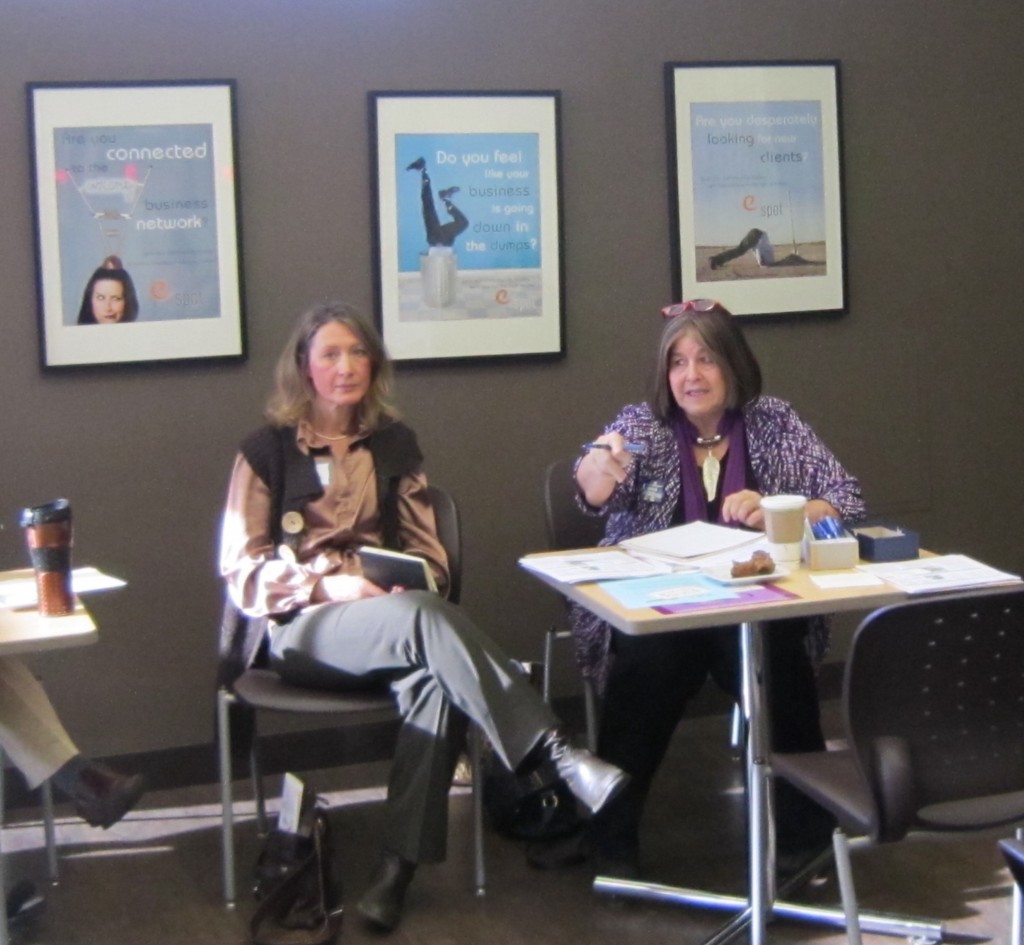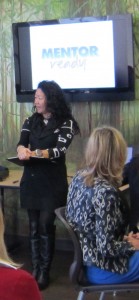BURLINGTON, ON November 23, 2012 Becoming an entrepreneur is now fashionable; it’s hip. And if you’re a budding entrepreneur then you need a Mentor. Learning how to choose a mentor has become another arrow in the quiver of any university graduate looking for a job or the person out of a job, which is the pool of people producing the entrepreneurs.
The Pythons’ Pit project, a Halton Rotary initiative being led by Fareen Samji and Tom McLeod, is getting close to its day of deliverance when applications have to be in for the $150,000 that is available for entrepreneurs who can convince a group of proven business start-up people that they have the right stuff and can make money out of an idea and their energy.
A group of people who have ideas and want to move them forward but need more funding to make that happen met at e-spot over in Oakville recently. They were there to do early practice pitches on their ideas – sort of like a baseball pitcher being in the bullpen practicing. This is the place you can make the mistakes that are going to be part of your success.

Tina Turner on the left with Donna Messer critique funding proposals for entrepreneurs who want to appear before the Pythons’ Pit.
There were a lot of mistakes made at the e-spot meeting. Of the close to a dozen people making presentations there really wasn’t one that was fully prepared. There were a couple of ideas that had potential and one that could be funded almost immediately.
Everyone has to start somewhere but the starters have to do more hard work and the people commenting on their efforts have to be quite a bit tougher with their comments and criticisms. At some point some of these people are going to get funded and if what we saw last week is the best they have – then a lot of money is going to be lost on ideas that have not been fully researched. There wasn’t one person in the group that had financial projections. None set out what they needed financially or how long it would take them to break even.
The critical comment was pretty soft. You don’t do budding entrepreneurs any favours when you soft pedal the criticism. The consumer spending their dollars will be brutal in their choices. People want value for what they pay money for and if the value isn’t there, they don’t buy and the business goes belly up. Not a pretty picture.
There was however some excellent advice given by Jeremy O’Krafka, a man who has made a business out of the mentoring business by organizing people who were interested in becoming mentors and people who needed a mentor but didn’t know how to find one.
One of his claims to fame is having held the World’s Largest Business Mentoring Event which got him into the Guinness Book of Records – and that is going to do what for his business? A conversation ice breaker I guess.
While talking to people who wanted to be entrepreneurs O’Krafka, who can be found at his web site, made a number of very, very useful points. His starting point was that you need a mentor and laid out three tips for protégés to get themselves ready for a mentor.
Be Prepared advised OKrafka: “Know who you’re meeting with – research your mentor before you meet. With all of the information that’s available on the web, there’s no excuse to not conduct a background check.”
Use your time wisely: “Get to the point. There are certainly networking situations that require the customary social niceties. But, if the agreed upon purpose of the meeting, is for the mentor to provide advice on your business, let that be the focus. One mentor told us how he called out the protégé he was meeting with, for wasting the first 2 minutes on fluff – welcome to someone who values their time.”
Take Action: “Strive to have at least one action oriented take away from each mentor that you meet with. Do it. Follow up with your mentor to let them know the outcome. There’s nothing that says our time together was worthwhile like a message to say thank you – and this is the progress I’ve made.”
OKrafka had some very solid advice – there is more that we will share with you as we follow the progress and development of the Pythons’ Pit.
Entries close December 1. The organizers are expecting a number of entries from students at the McMaster University, DeGroote School of Business and from students taking business courses at Sheridan College.
The entries will be judged by six area entrepreneurs who will determine where the $150,000 seed money will go and may, if they see potential that interests them personally, invest some of their own money.
The six are:
John Romano, owner of Nickle Brook brewery and operator of Better Bitters Brewing Company, is one of the six Pythons that will be looking critically at the proposals. At 27 years old, Romano dramatically altered his career path: he gave up aerospace engineering to open a small home brewery in Burlington called Better Bitters.
Randy Pilon, founder and current president and chief executive officer of Virox Technologies Inc. in Oakville, Ont., spent 14 years with Bausch & Lomb, where he rose through the ranks eventually becoming Corporate Vice President of the Canadian subsidiary. In 1998, Pilon founded Virox, a company with a patented technology in disinfection and sterilization.
Susanne Mikler, Co-founder and Owner of LC Liaison College | Culinary Arts, an organization that has more than 11 campuses located throughout Southern Ontario, Mikler and her business partner, husband Rudy Florio, have made Liaision College the fourth best culinary arts school in the world.
Nadir Ansari grew up in London, Ontario where his unquenchable curiosity and affinity for music, math and personal refinement came to life. After completing his Master’s thesis on Statistical Modeling of Bridge Loading from the University of Western Ontario, he joined forces with Brian Isherwood, to become partner and eventual owner and CEO of Isherwood Associates.
George Minakakis, is a Milton businessman and global retail leader. During his tenure with the Luxottica Group, he was solely responsible for the Canadian divisions of LensCrafters, Pearle Vision, Sunglass Hut and Licensed Brands with a combined store count of more than 300 locations across Canada. He also served as Chief Executive Officer for Greater China including Hong Kong where he was responsible for the expansion of Luxottica’s Premium brand LensCrafters with over 250 locations.
Don Dalicandro is Chief Executive Officer of ASI, a software company serving the mobile field workforce needs of Fortune 1000 North American clients. He has over twenty-five years experience working with large and medium sized companies in diverse business sectors including finance, manufacturing, consumer goods, oil and gas, field service, commercial office construction and leasing, retail and food service.

Grace Attard of the e-Spot, outlines the program for budding entrepreneurs who want to hone their pitch to the Pythons’ Pit.
There are a lot of people very interested in seeing how this initiative works out. Do we live in a community that fosters innovation and creative thinking? Do we have people in the community that will do the really hard work that it takes to get a business off the ground? Do we have mentors that are tough and direct with their critical comment or do we have people who want to play nice?
Personally, I didn’t see the kind of grit that it takes at the e-spot event. Nice people, some interesting ideas but none were really fleshed out and except for one – there just isn’t a market for the idea.
e-Spot, is a place where people, wanting to develop a business and have an idea they are passionate about, might want to be aware of and look into. Located at 353 Iroquois Shore Road just off Trafalgar in Oakville, with Grace Attar ready to answer questions. They have a membership program some might find useful and provide various consulting services geared to those who are not ready for and can’t afford the big consulting outfits. Worth looking into.
We will follow this.




















Sucessful entrepreeurs are few. Only about 5 per cent of start-ups last beyond 10 years. Entrepreneurs don’t work well under structured environments they need room to create.They get bored easy and they find their passion. They are not afraid of risk or failure. They are tenacious and will break rules and create their own rules to move their projects forward. We have a new generation of entrepreneurs and it is exciting. Burlington is a hot bed of entrepreneurailship. Look at our industrial parks and all the independent young business people on Brant Street. They wiwill create the jobs and create the excitment in down town Burlington.